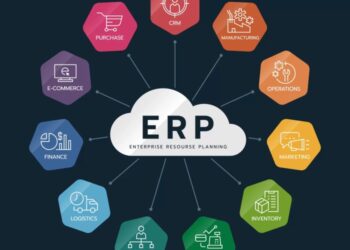Diving into the world of Fishbowl ERP, this introduction sets the stage for a deep dive into how this software revolutionizes business processes. From enhancing efficiency to optimizing workflows, Fishbowl ERP is a game-changer for industries looking to stay ahead in a competitive market.
As we navigate through the intricacies of Fishbowl ERP, we'll uncover its key features, implementation strategies, module functionalities, and integration capabilities to provide a holistic understanding of this powerful tool.
Overview of Fishbowl ERP
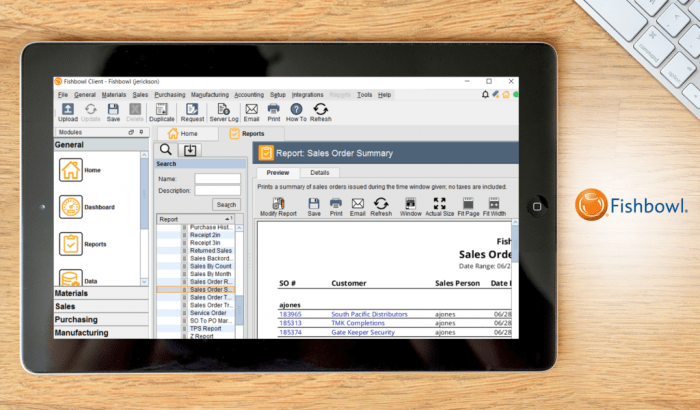
Fishbowl ERP is a robust inventory management software designed to help businesses streamline their operations and improve efficiency. It offers a wide range of features to manage inventory, sales, purchasing, manufacturing, and more, all in one integrated platform.
Industries Using Fishbowl ERP
Fishbowl ERP is commonly used in industries such as manufacturing, wholesale distribution, retail, e-commerce, and more. It caters to businesses of all sizes, from small startups to large enterprises.
Key Features and Benefits of Fishbowl ERP
- Inventory Management: Fishbowl ERP provides real-time tracking of inventory levels, allowing businesses to optimize stock levels and prevent stockouts.
- Sales and Purchasing: The software automates sales orders and purchase orders, streamlining the order fulfilment process and improving accuracy.
- Manufacturing: Fishbowl ERP includes tools for managing bill of materials, work orders, and production scheduling, helping manufacturers increase efficiency and reduce costs.
- Reporting and Analytics: The software offers a variety of reporting capabilities to help businesses make data-driven decisions and monitor performance effectively.
- Integration: Fishbowl ERP integrates with popular accounting software, e-commerce platforms, and other business tools, ensuring seamless data flow across systems.
Fishbowl ERP Implementation
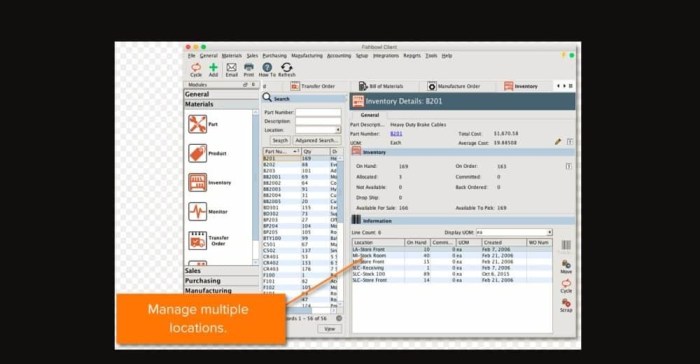
Implementing Fishbowl ERP involves several key steps to ensure a successful integration of the software into your business operations. It is crucial to follow best practices and be prepared to tackle common challenges that may arise during the implementation process.
Steps in Fishbowl ERP Implementation
- 1. Planning and Preparation: Define project goals, assign a dedicated team, and establish a timeline for implementation.
- 2. Data Migration: Transfer existing data from legacy systems to Fishbowl ERP, ensuring accuracy and completeness.
- 3. Training and Education: Provide comprehensive training sessions for all users to familiarize them with the software functionalities.
- 4. Customization and Configuration: Tailor Fishbowl ERP to meet specific business needs by configuring settings and workflows.
- 5. Testing and Quality Assurance: Conduct thorough testing to identify and resolve any issues before full deployment.
- 6. Go-Live and Support: Launch Fishbowl ERP across the organization and provide ongoing support for users.
Best Practices for Successful Implementation
- Engage key stakeholders throughout the process to ensure alignment with business objectives.
- Communicate regularly with employees to address concerns and provide updates on the implementation progress.
- Start with a pilot project or phased approach to mitigate risks and facilitate a smoother transition.
- Document processes and procedures to enhance user understanding and facilitate training.
- Monitor performance and gather feedback to continuously improve the system and optimize workflows.
Common Challenges and How to Overcome Them
- Lack of User Adoption: Provide adequate training and support to encourage user engagement and adoption of Fishbowl ERP.
- Data Inconsistencies: Conduct thorough data cleansing and validation to ensure accurate information in the system.
- Integration Issues: Work closely with IT teams and software developers to address integration challenges and ensure seamless connectivity.
- Scope Creep: Stay focused on the initial project scope and avoid unnecessary additions or changes that can disrupt the implementation process.
- Resource Constraints: Allocate sufficient resources, including time, budget, and personnel, to support the implementation effectively.
Fishbowl ERP Modules
When it comes to Fishbowl ERP, there are several modules available to help businesses streamline their processes and improve efficiency. Each module serves a specific purpose and offers unique functionalities that cater to different aspects of inventory management, manufacturing, and more.
Inventory Management
- The Inventory Management module in Fishbowl ERP allows businesses to track their inventory levels, manage stock locations, and optimize reorder points.
- It helps businesses avoid stockouts, reduce excess inventory, and ensure accurate stock counts.
- Businesses can utilize this module to generate reports on inventory turnover, monitor product performance, and forecast demand for better inventory planning.
Manufacturing
- The Manufacturing module enables businesses to create bills of materials (BOMs), manage work orders, and track the production process.
- It helps streamline manufacturing operations, improve production efficiency, and ensure on-time delivery of products.
- Businesses can utilize this module to schedule production tasks, optimize resource allocation, and monitor work order progress in real-time.
Sales and Purchase Orders
- The Sales and Purchase Orders module allows businesses to create and manage sales orders, purchase orders, and quotes.
- It helps businesses track customer orders, manage vendor relationships, and streamline the order fulfillment process.
- Businesses can utilize this module to automate order processing, track order status, and generate invoices for seamless transactions.
Shipping and Receiving
- The Shipping and Receiving module in Fishbowl ERP helps businesses manage inbound and outbound shipments, track shipping costs, and optimize delivery routes.
- It enables businesses to streamline the shipping process, improve order accuracy, and reduce shipping errors.
- Businesses can utilize this module to generate shipping labels, track shipments in real-time, and provide customers with shipping updates.
Fishbowl ERP Integration
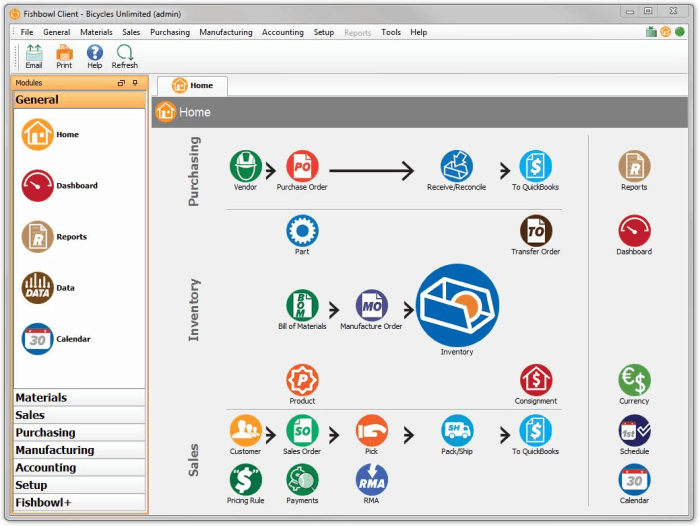
Integration is a crucial aspect of any ERP system, including Fishbowl ERP. By seamlessly connecting with other software systems, Fishbowl ERP can enhance its functionality and provide businesses with a more comprehensive solution for their operations.
Benefits of Integrating Fishbowl ERP
- Improved Efficiency: Integrating Fishbowl ERP with accounting software can streamline financial processes, eliminate manual data entry, and reduce errors.
- Enhanced Customer Relationships: Integration with CRM platforms enables businesses to access customer data, analyze trends, and provide personalized services, leading to improved customer satisfaction.
- Expanded Sales Channels: Integration with e-commerce platforms allows businesses to sync inventory levels, process orders seamlessly, and reach a wider audience online.
Ensuring a Smooth Integration Process
When integrating Fishbowl ERP with other software systems, businesses should follow these best practices to ensure a smooth transition:
- Define Integration Goals: Clearly Artikel the objectives and expected outcomes of the integration to align with business needs.
- Choose Compatible Systems: Select software systems that are compatible with Fishbowl ERP to avoid compatibility issues and data errors.
- Collaborate with Experts: Work with experienced integration specialists or consultants to facilitate the integration process and address any challenges that may arise.
- Testing and Training: Conduct thorough testing of the integrated systems to ensure data accuracy and functionality. Provide training to employees on using the integrated platforms effectively.
Closing Summary
In conclusion, Fishbowl ERP emerges as a versatile solution for businesses seeking to streamline their operations and boost productivity. By harnessing its functionalities and integration possibilities, organizations can pave the way for growth and success in an ever-evolving business landscape.
User Queries
What industries commonly use Fishbowl ERP?
Fishbowl ERP is commonly used in industries such as manufacturing, distribution, retail, and e-commerce.
What are the key benefits of Fishbowl ERP?
Some key benefits of Fishbowl ERP include improved inventory management, streamlined processes, enhanced efficiency, and better decision-making through data insights.
How can businesses ensure a smooth integration process with Fishbowl ERP?
Businesses can ensure a smooth integration process by conducting thorough research, selecting compatible software systems, and engaging with experienced integration experts.

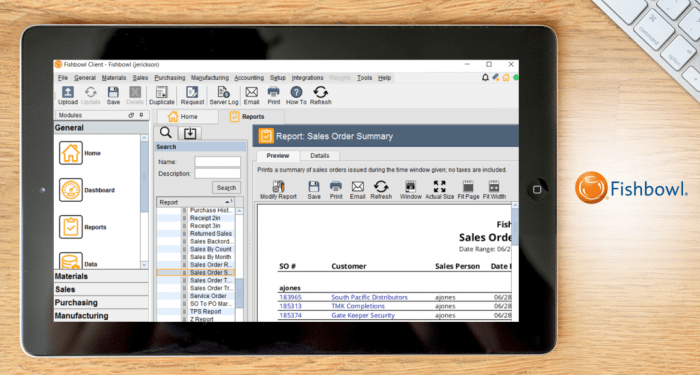






![Best Construction ERP Software [2024 Edition]](https://health.bandungnews.id/wp-content/uploads/2025/10/Top-10-Best-Construction-ERP-Software-to-Use-in-2024-1-120x86.jpg)


